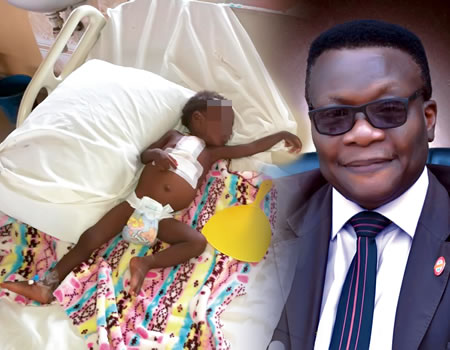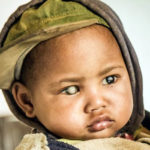No parent prays to have children with an abnormally developed heart that leaves them with difficulty breathing. Sade Oguntola, in this report, recounts the case of a 15-month-old boy that was successfully operated upon at the Obafemi Awolowo University Teaching Hospital (OAUTH) complex, Ile-Ife, Osun State, born with a heart that cannot function beyond his second year birthday.
Donadrian Abioye, a one-year and three-month-old boy was diagnosed with a bad heart. It all started with rashes over his whole body four months after he was born in a faith-based home in Osogbo.
His mother, a school teacher and a mother of one, after he started having difficulty breathing, took him to a nearby hospital where an X-ray test indicated he had pneumonia. He was then referred to Obafemi Awolowo University Teaching Hospital Complex (OAUTH), Ile-Ife, Osun State.
Obasanjo campaigns for Buhari’s reelection in United States
Subsequent tests at OAUTH complex in February 2018 showed that little Donadrian had a heart problem. His heart had a hole; blood was pumping absurdly. This has already started to affect his health since he is always in and out of the hospital because of lung infections.
“Donadrian, at birth, weighed over four kilogrammes, had fair skin like his father, blue at birth and was always in and out of the hospital because he was frequently sick,” recounted, Mary Abioye, his mother.
Donadrian is one of the six lucky children that benefited from heart surgeries at OAUTH complex in January. He was diagnosed with transposition of the great arteries.
Due to abnormal development of his heart during the first eight weeks of pregnancy, the large vessels that carry blood from his heart to the lungs and to the body are improperly connected. Essentially, the connections in the heart are “swapped” or switched (transposed).
Donadrian is the first child to have this wrong connection in his heart repaired successfully in West Africa, a feat that puts the name of OAUTH complex, Ile-Ife in the annals of medicine and history.
One of the doctors involved in achieving the feat at the hospital, Dr Uvie Onakpoya, a cardiothoracic surgeon, said that most babies with transposed great arteries are very blue (cyanotic) soon after birth due to a low oxygen level.
According to him, babies with transposed great arteries need surgery soon after birth to change or switch their blood flow to ensure oxygen-poor blood goes to their lungs and oxygen-rich blood goes to their body and prevent them dying.
He added: “Among the congenital heart disease, transposed great arteries are not very common but it is uniformly deadly in Nigeria because nobody had ever carried out such a surgery. And without surgery, in 100 per cent of cases, such a children will die. The child may not survive up to two years.”
Dr Onakpoya declared that this arterial switch, the first to be done in the West African sub-region, has “given a new life back to Donadrian” because it is curative.
“Donadrian, like the other five children with holes in their hearts, is going to have a normal life like every other child. They will leave as if they never had a hole,” he added.
Certainly, not all children with heart problems experience symptoms at birth, but children like Donadrian with transposition of the great arteries are very blue soon after birth due to a low oxygen level.
Aside from the baby becoming blue soon after birth, Dr John Okeniyi, a paediatric cardiologist, states that they may also seem to be working hard to breathe and have trouble feeding. Of course, these symptoms may also evolve over time.
How bad the symptoms are depends on the type and size of additional heart defects and how much the blood can mix between the two abnormal circulations.
Although children with transposition of the great arteries probably will die within the first few weeks of life, Dr Okeniyi says the presence of three other holes in Donadrian’s heart was what really kept him alive till now, though he was not growing well.
Donadrian was always having pneumonia and the blood pressures in his lungs, which is called pulmonary arterial hypertension, is usually always very high.
Globally, eight to 10 out of every 1000 children are born with a heart problem. This condition that is medically termed congenital heart disease is a major birth defect among children. It is often life-threatening.
In Nigeria, almost 60,000 children are born every year with heart diseases. Unfortunately, a large number of them are dying because not much is being done to treat them.
It is possible for a pregnant woman to know if her unborn child will have any birth defect. According to Dr Okeniyi, an anomaly ultrasound scan taken between 16 and 22 weeks of pregnancy can help to detect any congenital malformation.
Ensuring that pregnant women deliver their babies in competent health facilities he added was also important in preventing defects at birtth..
However, Dr Okeniyi stated that such things as a baby not crying or not well enough at birth; and a baby looking blue or being born too small for age at birth should be pointers to the possibility of something wrong with that child.
OAUTH complex’s Chief Medical Director, Professor Victor Adetiloye, however, expressed concern over a large number of children born with heart defects in Nigeria.
He states: “The problem is that we have so many children with congenital heart diseases. At every clinic day, we see no less than five cases in the hospital.
“Though there are very few resources and trained personnel to handle these cases in the country, our target is to be able to do about 400 of these surgeries in a year.”
Since 2016, OAUTH complex, Ile-Ife has carried out 56 heart repaired in children and two in adults. The hospital’s cardiac centre is under construction to ensure that it can do heart surgeries on a daily basis.
Professor Adetiloye stated that it is far cheaper to have a heart surgery done in Nigeria than in other countries like India or Israel, adding that heart surgeries at the hospital cost between two and three milllion naira.
However, he described Donadrian’s heart surgery as an exciting one for the hospital which also offers other specialist serivces as hip and knee replacement surgeries and kidney replacement.






